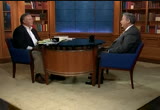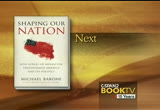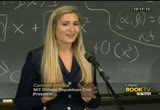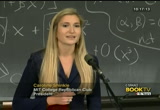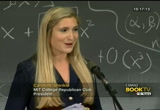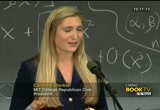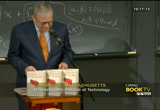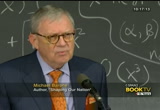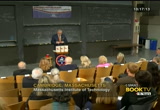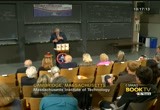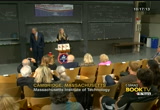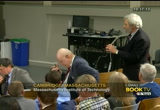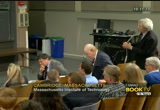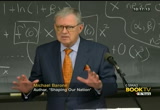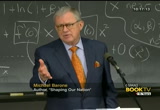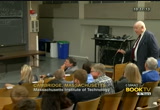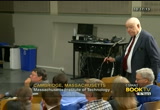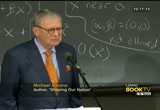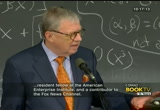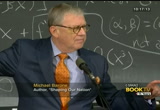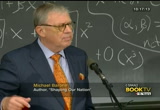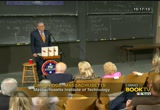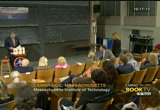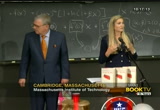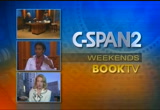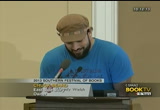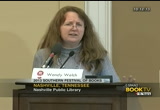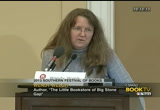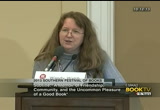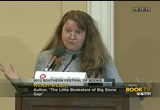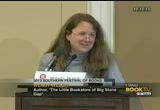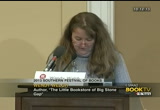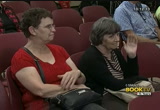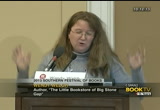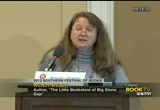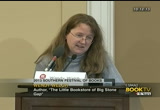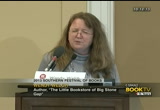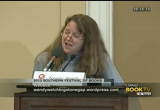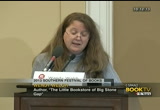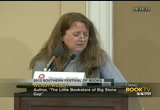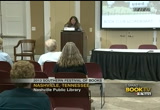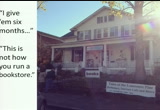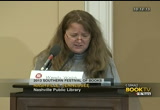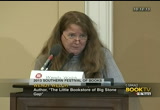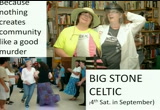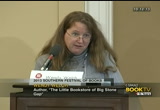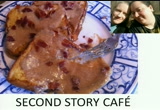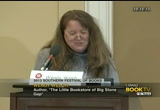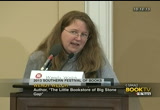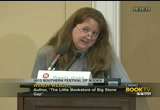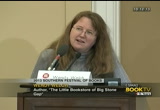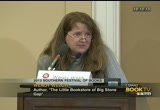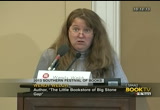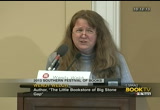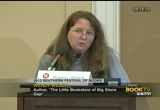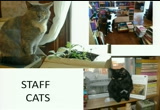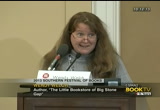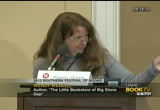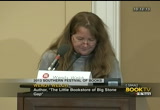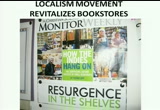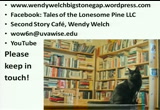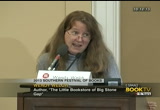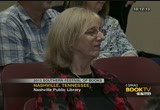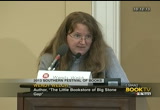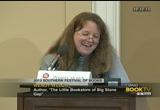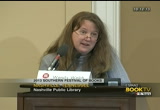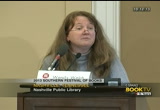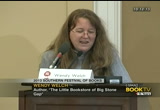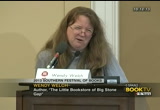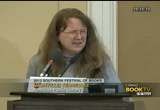tv Key Capitol Hill Hearings CSPAN November 29, 2013 10:00pm-12:01am EST
10:00 pm
>> that was "after words", book tv signature program in which authors and nonfiction books are interviewed by journalist on public policy makers, legislatures, and others. airing every weekend on book tv at 10:00 p.m. on saturday, 12 and 9:00 p.m. on sunday, and 12:00 a.m. on monday. you can also watch online. go to booktv.org and click on "after words" in the book tv series and topics list. ...
10:01 pm
>> good evening. i knew that you would be a wonderful audience. esteemed gas, of members of the m.i.t. community local chapter representative m >> activists, welcome to the m.i.t. college kickoff to the 2013 political lecture series. i am president of the m.i.t. college republican club on behalf of our members the 84 participating in this very special evening with our esteemed guest, michael barone. on this grant campus with this historic city in this, of that has produced so many leaders we are
10:02 pm
building an inclusive organization and focus on the important issues, economic issues, the life changing issues that affect the future of mankind has reshaped our great country's political landscape. the divide may be why did washington but not here as the club is reaching out to larger diverse audience. to everyone here tonight regardless of affiliation. our guest speaker michael barone plays a key role to shape the political debates as a the york times best selling author political analyst and commentator. legendary for his wit and
10:03 pm
wisdom and world p.o. he is an authority on the demographic patterns and details that explain the country from the inside out. his book shaping our nation how which transforms america and its politics a product of meticulous research. the book that shows what use of migration and history history, economics, politics and culture over the last three centuries is met with rave reviews. the pulitzer fries with being a historian at the university of pennsylvania says nobody knows the political masque of the united states better than michael barone. high praise comes from another pulitzer prize winner george wells to says
10:04 pm
there is bipartisan washington agreement about one thing. no one knows the political the windows american politics more than and michael barone. a senior political analyst he has written for the "washington post" and "u.s. news and world report" of the principal author of a almanac of american politics which has been published since 1972 a distinguished author among his books as severe times best selling book hard america soft america and the battle for the nation's future in 1962 michael graduated from the cranford school is in michigan and that happens to be my alma mater and a fellow graduate with romney and also our professor who
10:05 pm
has also attended with michael is with us this evening will the of the bat -- undergraduate degree from harvard yale after rafflesias graciously agreed to participate in question and response session with the audience and with up please join me to welcome from m.i.t. for michael brown. [applause] thank you very much caroline and fellow graduate as you have noticed as is mitt romney and i am honored to have my classmates in the audience the of the one of the last two years that got higher grades than i did. said of the eight distinguished academic record but you did note that
10:06 pm
i started to call author the first edition of american politics in 1972. i'd like 2.0 that it is highly unusual for the first edition to have been written by someone at the age of four. [laughter] but i will talk to day about the book shape the migration of. to talk about the current political alignment how it has contributed to them to elect a democratic president and a democratic house of representatives at the same time. to give a longer perspective for some idea of my interest
10:07 pm
of demography or political or and demographic members in their early fifties my parents purchased a set of the world book encyclopedia. from when i was seven years old if i was excited because men of the reference books in our house had the results of the census it is from the early fifties and there were distinct demographic changes. said to go with the encyclopedias were kept in swiss cities of the united states with a 1950 population and but for
10:08 pm
reasons that i have never been able to understand and of the other kids were interested in the senses. to study those trends to put that together with the human reality is is so i got started write-in a number of books at the beginning of the history of united states in the throes of democracy walter mcdougall says if you could go back 400 years and time to view the world you would find that very similar to today there were population increases of
10:09 pm
muslim world those varieties and strains and western europe have a merchant cows and russia and expanding from its base. in the western hemisphere vast populations ruled by the thin layer that the earth the americas 1600 is very different today. said with populations of native americans that are largely unconnected to do the rest of the role. then we have the third of most populous nation the producer is one-quarter of economic out but with so they won '02 percent that was there 400 years ago when
10:10 pm
10:11 pm
10:12 pm
for federal office and the bill of rights understood when they said congress shall make no law to establish a religion that meant no national religion but it also meant thate states could maintain their established church as the commonwealth of massachusetts and as it remained until 18303. americans have learned toe not only toa cope but prosperulu as a nation of cultural diversity but that has led to severe strains ended one case the irrepressible conflict. the first is the mass movement of lee scott irish before the american revolution they started to come over and some members in 1730 but there is a real surge after the seven years' war from the war of 1763
10:13 pm
like earlier colonial settlers they did not come because of a mixture of religious or political reasons and so were coercion like white indentured servants are black slaves the rich immigrants coming across the ocean and it migrants' moving from one franchise to another. they had some economic motives and incentives also to pursue dreams for they could live as they please or to escape nightmares to lifted the independent way. this was one of the three largest immigrant migrations as population of american history and the ellis island said the migration 1902
10:14 pm
through 1940 you. lee scott irish were fighting people wage a war with civil discord in scotland and northern ireland and. . . to kentucky and tennessee. the emblematic leader was andrew jackson or two years after his parents left northern ireland were defeated by the indians and expelled from the southeast. to beat the british at the battle of new orleans and a major part of the acquisition of florida which was where he found a couple
10:15 pm
of british subjects in his view committing a stiff against the united states so he tried them and hang them with property belonging to another country we obtained florida as a result he played a significant role in the annexation of texas and acquiring california by supporting a the scotch irish protegee polka who recognize the annexation of texas then led united states into the mexican war by which we take california and the southwest. so lee scott irish had a huge part to shape our nation, the expansion is part. immigration from abroad was light with the early republic with though world war a and there was not much immigration. but fast surges of internal migration almost split the nation.
10:16 pm
froebel's 200 years the new england yankees were pent up in their province as a moralistic and in tolerant people we have some good the new england yankee stock in the audience i can say. pent-up put by the french and british and iroquois alliance basically they said keep the french out of the hudson valley we will keep the pesky interfering yankees out of your territory to. the course that allianz ended the iroquois back to the of british many moved to canada and then the yankees pent-up 200 years and the colony's almost nobody settled in to be cousinly
10:17 pm
10:18 pm
think of those going together but they were they spawned one reform movement after another. the seneca falls convention held in the yankee country. prohibition of alcohol. some in the audience were from temperance which was a new inclement yankee foundation without a doubt and abolition of slavery. the republican party created in response to news slavery in the territories the kansas act 8054 was a yankee creation. and carried by fremont and 1856 and i have a copy in the book. you can see it going upstate
10:19 pm
new york and northern illinois and so forth. this was a vision of the cultural america that they believe. others had different mitt missions to enforce the slaves the inland migration the bird to outlandish of the atlantic seaboard to the mississippi valley it was a brutal migration of this labor transported over the and and slave labor made cotton growing hugely profitable. the wealthiest county in the united states was adams county mississippi. you can see the grant
10:20 pm
mansions there to this day. this was a hugely profitable thing. other maps that we have in the book is of map of cotton production 1860 percentage of slave population and it matches pretty much the county's carried by barack obama in the southern states in 2008 and 2012 still areas with large black majorities dating to the time when the slaves were transported to the mississippi valley. they both sought westward expansion over the issue of slavery of the 1850's. when lincoln was elected president with only the northern croats -- votes almost zero boats south of the ohio river at it to the base some german immigrants
10:21 pm
the result was secessionists and civil war. i sometimes called the northern victory the yankee conquest of north america but it was a complete. because of the attempts at reconstruction. historians said it was a great evil. it was an attempt to enforce equal rights for black americans to the south through military occupation and basically they got sick of its. i don't know if this sounds like the last 10 years but the settlement of the disputed election meant an end to the occupation to the south and equal rights for black americans for the time being. the nation and civil war was reshaped by the unexpected and unpredicted surge from ireland and germany starting 1846.
10:22 pm
the proximate cause was the potato famine where one died. it showed a population of 8 million in ireland. today including both the republic and the northern ireland is 5.5 million. it would never recover demographically from that. the famine also affected germany and continental europe that they were not so dependent on the potato. this was a huge surge of irish catholics one of the three largest searches as a percentage of population the irish catholics and the germans. the irish catholic with the first migrating group to head too big cities like mining or factory towns. they stayed in the city.
10:23 pm
they had migrated to escape the nightmare and was not well prepared for urban life as significant portion only spoke gaelic they had high a rights -- rates of crime and substance abuse but had a knack for politics holding monster rallies and constructing local political organizations and the irish america became involved with the machine politics of the democratic party that was less interested protestant word is also the american catholic church well into the second half of the 20th century. i have said that capital of irish america is a patrick's cathedral. in ireland to the catholic
10:24 pm
church was forced even the cathedral was on this side street was the anglican church in the square. in the united states they put st. patrick's cathedral on fifth avenue right next to the commodores house to establish they were across the street from rockefeller center. but it was a statement of that. the irish word gifted of music he and articulate and set much of the tone of the early 20th century from comedy to popular music. we got large numbers of germans. some states for mayor of the new york headed to the midwest, they went to german cities like st. louis or cincinnati or milwaukee.
10:25 pm
joseph pulitzer got his start by working for the competing german link which a newspaper in st. louis . it was cutthroats he was elected to the state legislature not quite 21 and he shot a fellow legislator legislator, he did not kill him but when you hear about the pulitzer prize keep in mind joseph pulitzer had a little bit of love wildlife in german-american up. who and many formed in the landscape that was reminiscent at the upper mississippi river of wisconsin minnesota or i was surrounded by the lovely hills that looks like germany. and they headed northwest to where the diaspora had gone.
10:26 pm
together they created a province of america. wisconsin and iowa tell people they are of german descent, and minnesota, north to kick -- north dakota has say capital named after their german statesman named bismarck and the streets are kept clean and neat. germany was of battleground possibly motivated by the desire to escape the desire of constant war it has consistently been the most pacifist isolationism part of america moving from one political party to another depending on which is most in line. 56 votes were cast against a declaration of war of world war i half of them came from the home of charles
10:27 pm
lindbergh who becomes the most prominent isolationist just before world war i. i make the point is this surges of migration is not just a response to economic incentive. read certain economists that will tell you it is a matter of the labor market if the wages are higher bennett it is improbable, people will move to rhode island. economic incentives play a role but people migrate in mass numbers to pursue dreams or escape nightmares. one illustration of economic incentives are not paramount is the migration that did not happen. over three generations of civil war through world war ii through 1940, very few seveners migrated to
10:28 pm
isadora's despite wages for two or three times higher. there was no political boundary or border patrol or immigration station but yet during fed years when more of than 30 million immigrants came over, only 1 million black or white southerners moved from south to north. this is of measure of said death of the wounds in a and a country that 38 million died. i mentioned said yankee north tried to impose racial equality but that was resisted by those in the north and white southerners were left free to order society through racial segregation and customs and forced by law and the violence and the threat of violence from those whose
10:29 pm
seldom ventured south and those who seldom ventured north. when i was at said dnc in 2012 or 2008, i've learned this id 100 years before local businessmen decided they could make money to take railroad cars into the mountains to fill them with snow and put them outside as a tourist attraction because most of the southerners had never seen snow. in 1938 based on five months of field work and showed how blacks were restricted of every day life they had to go to the back door and a black man had to look down
10:30 pm
when the white women past. this was hailed as a great revelation likes to work on similar but everything was known to every 10 year-old the country was that separate that people did not realize what was going on. in 8092 powless ireland processing center ( in new york harbor and the government took over from the states to screen for health or ability to support themselves. immigration was mid-19th century regulated by the state authorities of pennsylvania and new york. at a time of economic distress immigration from europe shifted from ireland ireland, britain, scandinavia to southern and eastern europe. there were mostly people who were second or third cast
10:31 pm
citizens pulls a anjous from the of russia empire. the prospect of = citizenship was attractive but the cultural customs and the language differences led many americans to feel they could not be assimilated. this is one of them are just. they headed to great cities on the east coast but not limited to york or cities in the great lake region and then people in the auto factory in chicago and cleveland zaph fastest growing metro areas in the nation at that time. then the flood tide was at its peak a and with huge
10:32 pm
numbers come to any of unexpected outbreak of world war i of the teefourteen. they came from different cultures sam thought they could not be assimilated or learned culture. so theodore roosevelt called for the americanization and henry ford held the citizenship class is for workers in his factories a and to a admirable job to speak or read and write english to learn traditions some said if i couldn't play a time machine number like to bring back to run public schools today that ran them is in new york city in 1913. but there were demands to be
10:33 pm
restricted in wartime restrictions on people's movements convinced government they could be restricted as a practical matter they impose quotas is in proportion of the 1890 census before there was the surge of migration came. so immigration noone declined to to a trickle then as is always the case you see less migration and people will hunker down to cultivate their own gardens and not take the risk then world war ii to have a military 38 million think how that would change the
10:34 pm
tone of our society. the demand for defense work colluding women around the country. this plus the unexpected postwar years opened the way to surges of migration to places that seemed in different ways to be a promised land. one was the surge of black migration one-third from the south moving to the urban north it a single generation over 25 years. interestingly mostly coming straight north virginia to washington, carolinian stooge new york from alabama to detroit mississippi to chicago louisiana to texas or california and they are five is huge numbers which
10:35 pm
made for great neighborhood change of phrases i heard in the jury to since though whites were not willing to live in black neighborhoods in the metro areas were growing rapidly as the blacks were moving in during and after the war. black income and education levels rose sharply during these years but has the floor high rates of crime and substance abuse, we had welfare dependency tripling between 1965 and 70 -- 75 for two decades but then the rates do drop along with welfare reform and the crime control a and the public policy initiatives followed by many other officials
10:36 pm
mostly republican but many democrats as well. the black northward migration stopped unexpectedly everybody predicted straight line trajectory. after the passage of the civil rights act those that are with them made south glasshouse of the nightmare a and continued to segregation in her bryant's long dash rice made less of a promised land also the surge of migration to california from the midwest brought billions of americans to california for the first time. how many here have been to california? just about every by a similar audience in 1940
10:37 pm
demographically similar only a few hands would have went up. they sought a land that was different from the rest of america than the percent of americans lived east of the rocky mountains and if you do that of weather is unpleasant for a large part of the year i don't have to tell an audience that. but didn't california so people start to see this as promised land california population increased the prediction was we have to go back there is no way to make a living in people figured out they raised families and
10:38 pm
the search migration continued for a long generation basically started in the 1970's it mated terrible and to better winter clothing one of my favorite inventions of the electronic crotch door opener. [laughter] made a living in the north and the winter of lot less of pleasant. also the comparative advantage domestic migration stopped entirely id 1990 the post cold war period but in contrast to those who are moving from other states we
10:39 pm
had a couple of million people move the large flow from california to texas. those moving to texas are not motivated by the climate the metroplex last year had diphenyl 100 days in which 94 out of 100 days the temperature was triple digits not a cloud in the sky. people don't come for the weather but california has had the outflow. those basically ended roughly 196-5470 and since then over the last four decades we have seen to search of migration one is slated and asian immigrants. in 1965 reached changed the
10:40 pm
quota is imposed the experts were asked if we had exports they said no they came from europe they had come in the past we have some but not like a search but instead a surge of immigration although as i tell people from talk radio the number of immigrants is between one-third and one-half of level. it was much higher during the ellis island period the scotch irish coming from mexico across the land border a and this stream of the rio grande that is not as wide aha as the charles
10:41 pm
river. they headed to the metro areas in the '80s and '90s then to the high growth area of georgia they were killed in the construction of landscaping and pursued the american dream to by the house is encouraged by government policies you have to give mortgages to hispanics and w-2 you do not need to see them. you are on the quarter. but it was said dream people tried to space achieve. suddenly it came crashing down id 2007 with the
10:42 pm
collapse of the hot housing market will get the foreclosure rates in the county's bernadine know, fresno, i guesstimate an awful lot were. and since 2007 according to the hispanic center migration has been zero a huge surge in has temporarily ended down the flow of anything is the other way from other areas has slowed and i think what happened for mexicans or others the united states seems less of a dream and mexico has faster economic growth and political reform seems less of a nightmare
10:43 pm
but my prediction is the framers that another wave of migration after we saw from one generation. the other surged over the last 40 years has been featured no. middle americans half and then leave the a high cost in a metro area i'd like metro new york or do try to. metro new york and detroit with tough for the year period grew faster than the national average. those two areas for example,
10:44 pm
have grown scarcely at all between the four years between 70 or 2010. going to places like florida , texas and arizona you can see the raw census data comparing in 2010 but then 40 years later it had 19 million people. then did 2010 texas had 25 million people. that is a significant change of the political ramifications as well. the people who choose the dallas fort worth metroplex they do call that that's offer a promotion to double
10:45 pm
salary they will not move to the san francisco bay area and vice versa. those who think of moving to texas and this has resulted in political polarization as more states it is whittled down as a list of target states for elections. the current recession and sluggish economic growth and then it it starts unexpectedly of dreams and desires that are hard to anticipate that experts can anticipate that they do not foreshadow.
10:46 pm
those with diverse cultural political believes my argument is we have done a terrible job it is worse than any other country of those that have ever existed we have a template of how to deal with it. the founding fathers gave us individual rights and religious tolerance and rule of law and a framework that has not been applied facially through american history to prevent the outbreak of a civil war but it is a useful template. we have managed to do these things before a and we should be prepared for whatever unforeseen things may happen again. let me conclude by making a couple of comments by today's political scene that has been a subject of much
10:47 pm
news lately and house searches of migration have contributed to that. we had a volition migration here is data you may not believe the 76 presidential election san francisco bay area voted democratic by 51 / 49. the last election it was 77 / 22. the parts of texas that are not in the metro plaque san antonio or austen or houston cody almost 70 percent jimmy carter. 76 texas went democratic california when a republican and for ford. things have changed politically in the last 40 year period the carter for the election is a little bit of a misleading precedent
10:48 pm
because each party nominated from their historic homeland ford from michigan and jimmy carter from georgia they don't call him general sherman they just call him sherman. one of my favorite political statistics is the number two-stage jfk 1960 the number one state was rhode island number two was not massachusetts it was georgia. why did george of votes heavily? because sherman had marched through the imprint lasted a long time. we have different cultural parameters wide we have a country eckhardt going into
10:49 pm
the 2012 election cycle with mild to run negative ratings of the house of representatives and most people vote straight tickets why did we reelect the house of representatives? because democratic voters who tend to be liberal on cultural issues they tend to be more important of economic issues blacks, hispanics, up liberals coming tended to cluster in central cities in
10:50 pm
university towns thank communities and have huge percentages to give democrats a big advantage. we'll get the election you will see barack obama 155% or more of the vote and 13 states only 91 votes short of that college majority those states were not contested. the vintage comes then equal population because outside those democratic clusters republican voters are spread more evenly around. so you find them, they're hurt in the electoral college only in those states
10:51 pm
55% or more he had a much longer route to go but when you look at congressional districts you see a different picture not just because of redistricting it is a minor effect. if you compare george of the bush 2004 reelected with a popular vote and 2012 reelected 51%. bush carries the electoral college barack obama electoral college 332 nearly 50 more. but how many congressional districts? that is not relative but in a straight ticket country it is relevant for the house. george of the bush 255 john kerry 180. barack obama 201-2209
10:52 pm
districts mitt romney 226. one of the reasons you have a republican majority in the house is demography the way americans have spread themselves around the country into the resulting political gridlock. so that is built into the system from surges toward migration by james madison in the other men who signed the constitution whose set up separate branches of government to say the president runs the government the congressman said but i thought that imply a is duty of consultation between the different bridges of
10:53 pm
government. but the conflict is there it is sewn into the system with the two parties competing pretty closely i think we can look forward to more of the same. so with that a an article in "the wall street journal" the opinion page i will conclude this talk and ask for your comments and suggestions. thank you very much. [applause] >> i think your remarks to leap with the political landscape into perspective we will now open the dialogue so please use the microphone if you have the question. do we have a question?
10:54 pm
>> you often find ourselves on opposite sides. i am taken by your idea abies spontaneous migration and then almost as mysteriously ccs they had begun for no apparent reason. it seems one can explain the rapid rise like any schaede reaction and your idea of a dream is a good one because they are contagious id will
10:55 pm
continue to grow unless something stops them it eventually there is a saturation because that is not sustainable. what stops it? it seems a microculture? a group of people who come over to be with others to form a microculture but the generation period is of assimilation and that begins to you rhode and just as quickly you have another reaction happening that is why it stops so suddenly so with that process gives the
10:56 pm
nice s curve that is what most are used to because it is a very different explanation. it seems it is a very important thing to look at because it does the government of lot of today's politics. >> that is professor of material sciences at m i tag you are giving lsd scientific analogy is a fair way to say it assimilation takes place at different rates. the north and south apart 75 years is very low assimilation even within the natural -- national boundary
10:57 pm
but one that had the huge force is rolled were tear. it brought all these people together northerners and southerners and it brought ellis island in with the other groups the of world war ii cliche movie have one guy from brooklyn this is demographically accurate brooklyn had to percent of the population one at a 50 americans lived in brooklyn and most were from ellis island. it did have the cohesive force and in that post war period characterized as conformism with the ethnic differences that were under played it is fair to say.
10:58 pm
peace itself was an unusual event area like teach right -- detroit so that promoted a common culture of super assimilation and greater than in other periods. and it has moved people around geographically to other areas. >> i am a local and a successful politician. twice referring to the gate the diaspora and could it be the red sox diaspora? because there is the mortal kombat taking place.
10:59 pm
[laughter] i will return briefly to that in a moment but it would not surprise me to learn and this young audience that there are quite a few people who are upset and at odds about american immigration. cat may be the biggest problem of the republican party. i would like to venture that some of us may not realize everyone of you going back 1,000 years has just over 1 million grandfather's a and grandmothers. my middle name is beauregard michael barone likely comes from a family in the mediterranean region. we are all immigrants. i am descended from john winthrop.
11:00 pm
11:01 pm
11:02 pm
who are hugely concerned about the border are concerned mostly about yesterday's problem that the problem that is likely to be as large in years to come. so one of the things i have been saying is that i think we ought to consider higher-skilled immigrants and less toward extended family reunification. the senate went some distance and that direction and i think in both counts but not far enough in my view. the reason we have huge variation from mexico legally and been beside the illegal is not because they're is a big quota and the 1965 act for mexicans, but because of extended family reunification provisions. they came from the 1924 immigration bill. that bill was passed by a bipartisan majority at a time when republicans have majorities command republicans were carrying big cities with lots of immigrants.
11:03 pm
warren g. harding when in cleveland and new york and philadelphia and chicago. they said, okay. we will cut off ellis island with your family members come in. it was a concession to political reality and was the conception that ate up the bill because people came over in vast numbers in chain migration. babies are born here and so forth. i think we have to move toward some form of regular reservation or legalization, but we also ought to look at the example of our anglo cousins canada and austria. many more arrogance are coming through on. systems based on education, skill, and come, capacity to invest in. they have had and one higher percentages of immigration each year as a percentage of the pre-existing population and we do rand that have higher
11:04 pm
percentages of their population you are born abroad. they also according to the oecd report issued just last week have hired degrees of literacy, and numerous cecum ability to work with immigration technology . we want these high skilled people in vancouver, calgary, montreal. as an american i would want more in the united states. i don't see either party or a big lobbying groups aggressiveness. the big lobbying group for high skill is for each one be visas withstands the thai people to a particular employer which is nice if you want microsoft to get engineers and low wages. maybe you would like those people to just be able to
11:05 pm
operate legally in the free-market and see what they can contribute on their own without having to ask microsoft permission. >> thank you for taking time to talk to the group today. we appreciate having you here. my question regarding other major leading cities in the country, new york, boston, chicago, san francisco, l.a., philadelphia, the most productive all lean very much to the left. what is your rationale for that? >> she did not mention houston and dallas which are two of our six biggest. >> i would guess those of be leaning to the right. >> they vote republican, yap. atlanta. >> if you're looking at the northeast cities from washington telling him through boston, you're looking at los angeles, sentences go, a chicago, you're
11:06 pm
looking at the parts of america with the greatest income inequality. you hear democrats of people on the left saying we income inequality. c-span2 incomes to be cool. attacks in come. in the process date from middle-class people out. california according to the most recent statistics has the highest degree of income inequality in the country, the highest level of poverty in the country, 23 and a half%. i think some party members are measuring. we could talk as a side issue. but the fact is that california's liberal policies of needed a highly unequal state. the average people and servants. that is not a very egalitarian society. if you want a more egalitarian society tri texas and georgia.
11:07 pm
and, you know, look at the numbers. you also have had greater economic growth there. the state of massachusetts has generally done very well on this making basically massachusetts importing a high skill, high education people from exporting missiles go, but a relatively small as a state. you have got over 6 million people, little less than arizona . california has 38 million, texas has 25 million. massachusetts is almost like a single kind of nice mature area that has worked out well. you still have pretty high levels of inequality as well. i call on the people of say that they want more and ask them the question, how come the places that you run have the highest
11:08 pm
income inequality. i think it answer is, you tax middle income people out, high housing costs by environmental regulations and other things that california, for example, but also mature new york, and a population increase in the last 40 years. immigrants in, americans out. that has been the pattern. you know, if you want to raise a family and you are not high income, not communal, ph.d. educated, a decent job, what does a house cost you in the san francisco bay area with a los angeles area. yo public-school and most of the kids don't speak spanish. you start off around for her and $60,000. people and middle incomes cannot afford that. they're priced out of the market .
11:09 pm
what does the same house costs and taxes? 140, 180. out, and you can send your kid to of public-school spirit texas of the schools of their achievements. has big government high tax model worked well? and would argue not so much. massachusetts, maybe an exception. >> i have two questions. i love the cover of your book. could you describe the inspiration and for the image. the second question is, if you had one message for people to take with them regarding the book, what would that be? >> okay. the jacket photograph cover design was just handed to me by a subcontractor of my publisher. my reaction was i like it.
11:10 pm
i do urge you to take a look at the maps. this is my inspiration. actually, as per the usual of the contract to my page for the map. this is, you know, the fremont counties in 1856, the new england yankee diaspore. voting 60% for calvin coolidge, 68 new england yankees. it looks sort of the same. the single message that i wanted to take, the single message is this country can work. we have a kind of dna which has enabled people of a lot of different attitudes and origins in tastes and beliefs to live together. it is hard sometimes. it poses some problems.
11:11 pm
i am a little more minor key of the country in this book and i have been some of my previous writings. it can be difficult. -- and i guess the other thing is, and i have suggested this kind dreams can percolate up in ways that we do not anticipate. be alert for the latest dreams. the trans that one grows up with may not continue forever and certainly the ones that i have grown up with, as i have suggested by contrasting 1970 with 1940 or 1930, the movements are very different. and that is, you know, when i grew up as a little dim to of
11:12 pm
liberal democrats in michigan we assumed that taxes would find out about the modern world and change its ways and join michigan in the vanguard and so forth. welcome me know, the machine population in 1979, 2010, texas, i gave you the numbers earlier. 11 million, about the same. it goes up to 25 million. the last 40 years that model has worked. the way is open for others to argue. i think that is what president obama and most democrats hope will be the case. i kind of doubt it, but i am ready to see what portion of that i will be permitted to see. [applause] >> well, thank you again for that truly in lightning
11:13 pm
presentation and dialogue with the audience. now on behalf of the mit college republicans, like to present you with a small token of our appreciation which you can open really quickly. >> oh, gosh. i usually mangos things. one of the things that people will tell you is i am with plants. okay. [applause] >> and we hope you will spit from this month. keep that on your copy of -- coffee table. again, on behalf of our club thank-you to our audience members for attending the special presentation and a record two seeing you and future events. also, we are an unfunded club, so we appreciate any monetary donations you can make.
11:14 pm
we have a donation box on the table. again, thank you for coming. [applause] >> happy to come. >> all right. and we do have his new book available for sale comanche will autograph copies. make sure richard goodwin. thank you so much. [inaudible conversations] >> you're watching book tv, nonfiction authors and books every weekend on c-span2. >> you're watching c-span2 with politics and public affairs wheaties featuring live coverage of the u.s. senate. on week nights what he public policy events and every week in the latest nonfiction authors and books on book tv. you can see past programs and get a schedule and our website.
11:15 pm
>> the co-owner of tales of the lonesome pine youth crew. she talks about her experiences opening the store and how she made it a success. this is little wonder hour. >> hello, everyone.le p i am the proprietor and gasol staff member at east side story. i am truly honored and exciteded to introduce to the stage our e xt featured author. aside from being a wonderful onb the issue is a member ofer the i started and run an authenticendt little bookstore the big card club, a plan not yet made onth facebook, i will after today. this woman has been decided to change their lives and countless others when they left they corporate rat race to open their own version of what a bookstorei in a small town much like it
11:16 pm
removed to virginia, bought a house in maine and house into an home and a bookstore calledcall tales of the lonesome pine used books. fateyears back and sense -- sorry, few years gone since that fateful decision have not looke, back. ladies and gentlemen, please give a warm welcome and round oh applause. the french community in the on common pleasure of a good book. [applause] >> thank you. ha yes.togethpa we have to stick together.rt well, as i get started and want to know how many of you have the actually read the book and how many just heard something about it.lluide that will gile the but of all we're talking up today. ltle a little bookstore -- and thanka you for bringing a copy with you.ittle good. s and
11:17 pm
it started above six and a halfd seven years ago now. and it started because my husband and i flatter job that was sold this trying in on thel part broken and broke in a verye small town in southwest virginid or was going to take in a simplo job and do it for a year and ans hangout and regroup and read something and get our feet back under arrest and restore our an faith in humanity in move on to something else. a i had just gotten a ph to be one of the useless degrees possiblet and the economy was tanking.ngr 2006. and in the course of looking for the little apartment which would be cheap we came across this huge five-bedroom edwardian,1 1903. in the onl oy reason we went ino it was because the person who was showing us around happened s to pick up the tape is you wanted to -- she just wanted to
11:18 pm
see what was in it in it that we had lived in an all out in england, 79 the state house.stok she said, you guys don't mind. o after list this property andomo, won't have a chance to see it. she stopped and we lookedd around. i still think -- we go back ande forth on whether she set a u supper not.y when we walked away from that house on like it think the whole time i was walking through this, huge old house with this creakyh wooden floors and the big windows, like it think is what h beautiful books toward this will make. mak my husband and i were kind of folkie in did a lot of weekend road trips. when you're driving home at 8:00 tonight on a sunday and i'm tired you have to find somethinw to talk about.dawe the little less talk about how s some day we would run a usedld book store.e'r so the whole time we're walking through unthinking, this is the perfect maxtor.
11:19 pm
except for the fact it is in ael town of 5,000 people.and it is really quite nice.ous we walked through the house. it was a nice thing.ookt we went on and looked in a an couple of more apartments.ll go ahead and have lunch. u so my husband and i went to one of two restaurants the in big stone gap. it's a small town. and we sat there of a basket, mexican restaurants.'t we kind of did not like each or. other.wore i swore to myself the wouldme ot it tstore was not going to come out of my mouth. it was the wrong time. the economy was tanking.zo and i did not have a marketable job skills at this point.as, i was like this over educated woman who could do anything but anwe'rnot prove it to anyone. and we were looking at this hipple, tiny town where yuppie
11:20 pm
hippies might not be entirelykn welcome.we m we might bbee democrats.ot go this might not go well.g and i'm thinking, this is not a going to work.band i'm not saying a word. my husband likes of me.hat he said, that has to make a great bookstore. of kerry. this change the whole tenor of the conversation. of thon i said, yeah, it would. rethinking of that. no, no, it is too silly. bo it is absolutely no point to aot that.point. i said, yeah, you're right. that's a dumb idea. poss it would be awful.to elected me and said, there willd start a bookstore. yeah, yes, we will be the herot to me again and says, what if some day yesterday. and as where aegean, the waist up must've felt we were crazy.y the only thing that i could thing to do, i reached across the table and custom on thean mouth. a as athat is now eastern the bookstore. .as a dumb thing toit do. really dumb thing to do.what
11:21 pm
we did not know what we were doing. no no clue, the market plan, no money. we had walked away from a very , difficult situation on the house of right. in order to buy will have to geo a mortgage which write me because i'd never had a mortgage before. he always been in the fortunate position of owning a house, but having walked away from this difficult position as it ever going to do is wrong to have toa get a mortgage and tucked downed and get in there and make it work. well, one of the fastest ways to despre success is to be desperate. we were just absolutelysink terrified that we were going too sink in did not have anything to sink into, so we threw ourselver in the getting this house. one of the things that we were t determined would happen was that we would welcome the community.t of course the community wouldlcu welcome us because there were selling books.n've it is not love books? it is cool to have a bookseller
11:22 pm
booksell in your family.nity and we figured, the communityd r would strain through.ing, a w well, there's the stuff calledh advertising. and even if we had, we didn't have any money. so we were sitting in this house trying to figure out how to tell people that we were going to open as a bookstore, and we had a whole lot of wooden book schells up -- book shelves up lining the room that my husband had built, and we didn't have any books on them, and we didn't have a plan for telling people how we were going to get started, and we didn't have any more money. this is called a problem. we need a slight solution here. we began to look at our own book collection. how many of you are by lo files? i was -- bib low files? i was kind of betting. how many of you have, oh, 3,000 books right now? that's what we did. we tallied about 3,000 books we
11:23 pm
owned personally. 2,000 of them went into the bookstore. and we sat and made deals. we sat upstairs unpacking our boxes box by box, book by book negotiations. you get to keep this one if i get to keep this one. you get to keep positively fourth street if i get to keep croceing with finger punishments. [laughter] two weeks later i was in the laundry hamper, and he found a book he had hidden so it would not go through this process. so we threw our books into the pile, and we looked around for a way to advertise without any money. well, the only thing we had was our home printer and a really good car. the other thing that was problematic for us is big stone gap is in between markets. there's king's port and then there's roanoke, and we're in the middle. and there aren't any big cities around us. so we're not anybody's market. we had a couple of local issues of the paper that come out a couple times a week, but that's it. if there's a tornado, we get the
11:24 pm
warning 20 minutes afterwards because we're not on the stream. so there was no way to advertise. well, we had found a local church in the community, and we had met a woman there named terry who ran the local chiropractor's office, and she home schooled, and she really wanted a bookstore for her kids. she was really excited we were in town. she said, tell you what, when you open, i will get free books from you, and in return, you can use your photocopier for free for anything you want. she had a color photocopier. so we quickly sealed this deal, and we went and made hundreds of photocopies and drove around leaving them at local businesses, hi, there's a bookstore starting. i went to yard sales, hi, i see you like books. and everybody said pretty much the same thing, a bookstore? you're nuts. yeah, we probably are. this is where it started to get interesting. how many of you are from a small town? okay.
11:25 pm
you probably recognize what i'm going to describe. we live in a small town in the coal fields of ap appalachia, ad there's this funny little drum beat that runs through these small towns. it's kind of on the one hand we belong to ourselves and we're powerful in and of ourselves, and in the other we don't like incomers because they might change the way we are, but they might also, they might also be people who push the boundaries of what we went to explore about ourselves. so what happened was we had people from outside who were e-mailing us and saying you're not going to find enough people who can read in these small towns that are going to want to frequent your bookstore. and we said, yeah, yeah, yeah, thank you very much. that's not the case. but inside the town we had people saying one of two things is going to happen. either you're going to open the bookstore and it's going to be successful and you're going to go straight up the road to
11:26 pm
roanoke where successful people go because no one is here unless they get stuck here. no one wants to be here. or you're going to fail, and you're going to stay here, and you're going to be nothing because you're here. now, if you had a daughter who had that attitude in life, wouldn't you just take her to get her colors done and buy her a new dress and talk to her about the way she was thinking about herself? these are small towns. these are sort of the trouble that small towns are having within themselves. and when we saw this kind of repeat mentality, because we had come from a small town in scotland, and my husband often refers to anything north of edinborough as being the rest of scotland. it's just too small. and there's a saying that runs through scotland, too poor, too wee, too stupid. and that came up over and over again as we explored how we were going to run this bookstore. people kept telling us not that we couldn't run a bookstore, but that we couldn't run a bookstore in a small town in the coal
11:27 pm
fields of appalachia because there wouldn't be enough business, because we weren't local enough, or there wouldn't be enough business because we were too local, and people would think we were stupid. that is not a recipe for success. it's not a recipe for success over the long haul as a sustainable community, and one of the things i do now as a college professor over and over again is i tell my students, don't buy into that. it's not true. you are wonderful, intelligent, smart people with the ability to change the world in your hands, and you are our best export. it's not coal that we export in appalachia, it's 18-24-year-olds with brains and vision, and we need you back. so if you're listening to me, i know c-span booktv is maybe not the 18-24-year-old demographic -- [laughter] but let me tell you, come home. come home and build a business, because we need you. that is the wave of the future for us and for all of america, the small businesses that we
11:28 pm
need. that's one of the reasons we're proud of what happened with little bookstore. we opened, and about three years after we opened we were stabilizing. a lot of things went wrong in those three years. but when we stabilized, i sort of sat down and said to myself, okay, what was that? and there's a wonderful quote by flannery o'connor, i always mess it up. this is a paraphrase, but it basically says don't ask me what i think until i've written it down, because i can tell you when i read it. and that's pretty much what happened here. i sort of sat down and wrote the story of what happened with little bookstore, and when i was telling it to a friend of mine, she said, that's funny. you should write that down and send it somewhere. well, sooner or later i found someone to send it to who thought it was both funny and charming, and the little bookstore was published. so what happened after that got really interesting. these three covers here, the one on my left shoulder is from
11:29 pm
korea and then the american one, and the far one is from portugal. when they came out in those countries, we started getting e-mails from booksellers in those countries, and they started saying some of the same things that we had found when we started our bookstore or as we were fighting the big a and some of the other things that bookstores fight these days, any small, independent store fights these days. and we began to find that we had joined and helped stabilize a community sort of like what chuck was talking about. his bookstore in east nashville, our bookstore in southwest virginia. independent bookstores all over the country, all over the world, we are community anchors. the big bookstores like asheville or the tattered cover in denver, those bookstores are economic anchors. they get down into the sidewalk and the roots of their community, and they pull other stores around them, you know? there are chocolate stores next to asheville's, there are coffee shops, craft stores, bead stores
11:30 pm
and dog stores, all of them surrounding where these book lovers are going to congregate. same in tattered cover, same in nashville, same in memphis. but in some of the smaller towns, little bookstores are also community anchors. we're less economic because we don't have the power to pull other people behind us. it's not like you build a walmart, and the next thing you do is build an applebee's, but we opened our bookstore six years ago. this past tuesday we opened a café in the second story of our bookstore. the economic stability we bring to our region, we're very proud of. but more proud are we of the community of people that have been built around the bookstore. we began to get people visiting the bookstore when the book came out. it came out last october. it did better than we expected it to do, and people who were reading it and were within a
11:31 pm
day's drive or two days' drive began to call us and say can we come and visit? whole book clubs would do that. so currently we have 12 book clubs that have visited the bookstore and nine we have gone to visit for more than a day trip and a bunch of other book clubs that have read it as well. the woman standing at the door, i don't think that can be me, because she's too skinny. anyway, that's one of the groups that came to visit the bookstore. over the course of running it, we began to develop a kind of a sense that when the book came out, a bunch of people came to us, and they were kind of shifting their feet and looking down, and they were kind of grinning, and they said, you know, we're really proud of you, we're really glad you're still here. this was six years after we opened the bookstore. we're really crowd of you because when you came, we gave you six months. yeah, you guys were the you're nuts people, weren't you? yeah, they were. what's funny about these two quotes is these are actually six
11:32 pm
years apart. the community said when we came it's not going to work, you're not going to stick the. six years on when the book came out online, there was one of my favorite reviews ever of this book -- i don't really read reviews. my husband reads them, but like many authors, no thanks, you know? if you want to talk to me, that's fine, but i'm not going to read the reviews. a woman was on, i think, good reads, and she gave the book a fair review, but she said i work for a bookseller, and i'm here to tell you, this book is fiction. this is not how you run a bookstore. yeah, baby, i know. [laughter] we got that. we know this is not how you run it. but six years on we're finding that it is how you work your way into a community. it is how you uphold a community. and that's what i want to talk to you about now. some of the things we do at our bookstore are sort of obvious, you know? every tuesday night there's a needle work night. we plot the revolution. that's owen, the staff cat
11:33 pm
that's on my lap there. he's sitting on what we call a spay and neuter afghan. my friends and i -- [laughter] >> yeah. if you don't spay and neuter your cat you get row afro after row of cats. but the cat that's sitting there, owen, the reason he got his name is because my editor, nicole, and i early on when we began to work together and she'd looked at the whole manuscript of the book, she said, you know, i really, really like this list of books that you've got that you love. some of them are unusual. but this list of books that you hate, i had put a top ten and bottom ten list in the book. she said i really can't publish someone who doesn't like john irving's "a prayer for owen meanny." i am sorry that this lowers me in your estimation, i know it will. see, she's crossing her arms in the front row here. i don't like that book, okay?
11:34 pm
i'm really sorry, but i don't. there, now i've said it. so nicole said, no, we're not publishing anybody who doesn't like that. there was kind of a lot of joking back and forth, and the next foster cat that came through actually was very ill, and he needed to be nursed, so i named him owen meanny. and i told nicole that owen meanny was now gracing the shelves of the bookstore. and she accepted that. she went ahead and published the book. we hold a lot of community eventeds in or near the bookstore, and one of the things we do twice a year is a murder mystery because there is nothing that will clear the air in a divided community like a good murder. how many of you had school issues in your small town? yeah? we had some issues where the county schools were going to consolidate, and they were going the pull town schools together and locate them out between two communities or, even worse, move
11:35 pm
one community school into the other community school. and, of course, this was largely about sports teams. people got upset. and be it got so heated people were unfriending each other on facebook, it was that bad. [laughter] so we held a murder mystery, and we murdered the superintendent of schools. and it was amazing how people cheered up after that. [laughter] you know? it just takes one good murder to clear the air. so we hold murders twice a career, and they're always themed on something that's going on in town, and people get out what's bugging them. they're like steam valves for the community. and every year we hold a dance in march and a celtic festival in september. the first year we held the dance in march, our bookstore was so empty, we started with 3500 books and the shelves just lining around the edge of the bookstore, that big edwardian mansion, we were actually able to hold the dance in the bookstore because it was just that crowded.
11:36 pm
that doesn't work anymore. yeah. that's the bookstore. you can see owen's checking out a box. he's always working. he's always working with us. so the bookstore is -- i like to say that we work on keeping it alphabetized. my husband likes to say that we are a treasure-trove where you make incredible discoveries every day, and that's because we're so disorganized. i told you about opening the second story café. that's actually their signature dish, the french toast with sea salt caramel sauce on top, and it's a famous seller. that's kelly in the corner there. i think one of the neatest things we've ever been able to do as a bookstore in our community is provide a need to the community because we had a beloved restaurant called the mutual. it was in a pharmacy, and a chain pharmacy bought the local pharmacy out and closed the restaurant. i mean, they weren't evil, they just needed to do it for their
11:37 pm
own balance and their own planning. but it wasn't a good move for the community. now, the man who runs that chain for the region lives in our community, and he's a nice man and a good member of the community. but we lost our restaurant because of this business decision. so jack and i cast about for someone who wanted to run a restaurant. we did not want to run one, but we wanted someone to do it. and we found kelly, and we offered her rent-free the upstairs use of our store if she would run a café, and we would make a profit share agreement once she reached a certain revenue rate. and she jumped at it. they've been open for a week. theyed sold out this morning. -- they sold out this morning. they opened for brother or sister at 8:-- business at 8:30 and they ran out of food at 9 a.m. it comes back to the need for small businesses to be the heartbeat of their community. that's what we do in big stone
11:38 pm
gap. we are not just trying to make our own money. we're trying to keep our community circulating in and for and of itself. how many of you were aware of the shop sitters story that went out last year? this was actually pretty funny. when jack and i realized that the book was going to be published, we had gone on a tour in 2011 so that i could finish one of the chapters of the book. we had gone out to five states and back up through the next five states, and we had visited small bookstores in little towns across america as far out as we could get. we never got to kansas before we had to turn around because we only had two weeks. we went to 42 towns. guess how many of them had thriving downtowns? 42 small towns. guess how many of them had thriving downtown areas? more than three. eighteen. eighteen of them had thriving
11:39 pm
downtowns, and the others you could practically see the tumble weeds driving through. but they all had walmarts and pharmacies on the edge of town, nice bright places that stayed open until 9 p.m. what they didn't have was a downtown section. so we wrote a lot about this in little bookstore of big stone gap, but what we realized as october was rolling around and the release date was coming and we were going back to those bookstores on an author tour, we realized we didn't have anyone to run our bookstore while we were gone. it's a very small operation, it's just the two of us, and it makes its ends meet with the two staff. so we put out just kind of thinking maybe someone would be interested in this. i contacted a friend of mine called the goodwill librarian who's on facebook, and i said would you mind to put out this little blurb that we're looking for someone who would like to live in the shop?
11:40 pm
we now live in the basement below it because we put the caée above it, but we said would you ask if there's someone who just wants to come and run the bookstore for two months, and they can live completely off our dime? they don't have to buy anything, they don't have to pay represent, they eat in the café, i mean, they eat in the café across the street or out of our fridge, whatever they want they can buy out of our cash box, but we won't pay them a salary. and do you think there's someone who's thinking someday they might want to run a week store or some -- bookstore or some college kid who's in between jobs, and my friend said i'll find out. so being the great marketer that i am, when i put that out, i actually failed to mention that it was because i had written a book and was going on a book tour that i wanted this person to do this. so we got all these really interesting e-mails from all sorts of people who were sort of interested in this deal. but it overnight went from four people to about 360 people who
11:41 pm
were tweeting and facebooking and reposting this status. and by the end of the day, there were a thousand people who had reposted this thing. unfortunately, what was happening was most of the people who like goodwill librarian are employed librarians, so we were kind of poaching in someone else's territory. ndey were all going i can gete f .. i'm thinking, oh, great, now i've done it. this is like a pastor who goes to someone else's congregation. but the goodwill librarian actually suggested we get in touch with robert gray who writes the column for shelf awareness, and he said -- we asked him if he would mind putting in a small ad saying we were looking for a shop sitter. he said, i'll do you one better, i get 750 words and send me some pictures, so we sent some cute pictures of owen climbing the shelves, and we tried to be charming and cute and hoped someone would want to do this.
11:42 pm
we had 186 applications, and the applications included places like sweden. my husband still regrets there were two women who applied from sweden, and they sent pictures of themselves in their bikinis, and my husband still regrets that we went on the book tour and didn't hire these women. it went everywhere. it went on npr, it went through the l.a. times, it went through a lot of big papers. and what i found was, okay, this was fun. this was nice publicity for the book because the second time we remembered to put the book in there, but it was also, it also reinforced at least two, maybe three things. one, we only did it because we thought it might be b a good idea. there was nothing cynical about it. it was just a way of making it work. and it went viral. for no other reason than that we just asked nicely, and a bunch of people responded nicely. we did not have people who were cynical about this at all. they were really genuine people.
11:43 pm
secondly, most of them were from big cities and, of course, we got a few applications that said, you know, idyllic country living, and i are work on -- i will work on my novel and this kind of thing. but for the most part, what we found were people who were kind of longing to get into what they recognized as a small community and kind of be jump-started as a member of it. there was this really poignant wish to be part of a team and a community, and you could see it in the applications that they sent us. and third, the bookstore is not dead. no way is the bookstore dead. if we had 186 people who actually asked to do this for no pay, just for room and board for two months, and we had a couple of thousand people retweeting and resending this over and over again, reports of the bookstore's death are greatly exaggerated, thank you very much. there's actually an article i'm going to show you in a minute from the christian science
11:44 pm
monitor said 2012 was the year of the bookstore. it goes pack to what i was saying -- back to what i was saying when we put this story out in the first place. when you do what's in front of you because you think it's important and because you think it's a good idea, nobody can take that away from you. and the consequences of your decision are bigger than just for you. nobody's going to beat amazon, right? but we don't have to. all we have to do is fly below the radar and do what we're doing. people want to come to our bookstore because it's fun. they want to pet the cats, they want to eat the french toast, they want to hear jack's accent, they want to tell us a story. they come not because we're convenient, not because we're easy, but because we're fun. and because they value us being there. we now employ people in our community. we employ kelly. we have a part-time person who works for us. we are slowly but surely creeping up. now we employ four people in the community, thank you, but in big stone gap that's about .1% of
11:45 pm
the population. so let's not curse the darkness, right? those of us who are bibliophiles, those of us who love bookstores and small towns, let's not curse the darkness. let's tush on the lights -- turn on the lights, keep the lights burning in our independent bookstores and greenhouses and hardwares across america because that's what keeps a community going. that's what keeps your young people there. so we were really proud of that story going viral. and, of course, i need to introduce you to a few people at the bookstore. that's beulah there in front of the planter. beulah is the shop greeter. of course, you've met owen meanny, he's the staff intern, and he does the actual brunt work. if we ever have a promotion, he has to do that. and then you see val kitty down there at the bottom, and val kitty is exceedingly proud of the fact that in the large print edition it is her picture that features on the cover. so she would like you to know
11:46 pm
that. sheshe is the chief financial officer of the bookstore. this is just one of a typical day at the bookstore. we were just having a few friends over for dipper, and someone snapped this -- for dinner, and someone snapped this photo. i told you a little while ago that when we, when the bookstore was -- little bookstore was published in korea and in portugal, people began to e-mail us from bookstores over there. well, it's kind of a joke, but i'm big in korea. [laughter] i'm big in korea. because publisher e-mailed and said you need to give us access to your photos right away, because we have a chance to put you in the national newspaper, like the big -- "the new york times" equivalent or "the wall street journal", and we need to do it right now. we've only got about four hours. so i said, sure, and i immediately made by translator an administrator. well, this is the picture she picked. so this picture went across korea, and i started to get a
11:47 pm
whole bunch of blog readers from korea and also a couple of friend requests on facebook. and when i translated the friend request, it said things like crazy people like you, which i hope means i like you, you crazy people. i don't know if it had actually cut off the crazy people like you should be put away, i don't know. [laughter] translator's not reliable. but we're really, really proud of the fact that the little bookstore has created two kinds of a community. we settled into that area, you know, heartbroken and financially broke people just trying to make something happen. and everything we've done has been, for the most part, because we were trying to make something happen. sometimes it happened well, sometimes it didn't happen at all. but we had no idea when we published the book that this second community would form of booksellers with heart, you know? independent booksellers who wanted to talk to each other, who wanted to solve their problems together. we tapped into, quite accidentally, in portugal there is a community of booksellers that actually gets together once
11:48 pm
a year and goes on a retreat. there are about 60 of them. and there's a bookstore on the east coast -- well, i'm not sure if it's in the east coast, but they had a seaside resort there, and the booksellers have an awards ceremony and a brainstorming session where they continue to work out how they're going to stay alive for the next year. not just stay alive, but thrive and be members of their community. we had no idea any of that was out there until this book sort of landed and began to make its own friends and bring those friends back to us. so it's not, oh, we're so glad that we got this going. we didn't. we didn't know it was there until we hit it accidentally with the book, and we're just so proud to be a part of that community and so proud to be a part of bringing that community together. so i think one of the reasons we're proud of bringing that community together is this quote, which i love. i think a lot of you have probably seen the quote which circulates on facebook all the
11:49 pm
time. it says when you buy from a local merchant, you're not just hoping a ceo get a second vacation home, you're paying for a little girl's dance lessons, sending a kid to college, helping someone plan their retirement. all those things are true. when you buy from your local community, that money stays in your community, and that money does good things for your community. and we're really, really happy that we're part of that movement. this is the article i was telling you about from the christian science monitor that 2012 was the year of the bookstore. i was one of several independent bookstore owners who was interviewed for it. and again, you can say that america's going to turn into a corporation instead of independent people, but there's always going to be people out there who just do what's in front of them because it's the right thing to do, not because they think they're going to get great financial rewards for it. trust us, we eat a lot of peanut
11:50 pm
butter, don't we, jack? a lot of mac and cheese. but we're okay with that because there's rich and then there's having a lot of money, and we know the difference when we're booksellers. i'd love to hear from you. these are the ways you can get in touch with me. on the blog, actually, on the blog today you will see chuck featured about this. we're on facebook both as tales of the lonesome pine and the second story café, and then our sales. fairly often jack gets introduced as mr. welch, and he takes it well. but we decided when we got married that he would keep his last name. [laughter] there's also a video on youtube of some of the craziness that we do from day to day-to-day, and we'd be more than happy to talk to you about that. the last thing i want to do is tell you the story of the day i found out little bookstore was going to get published. my husband and i having sent the manuscript off to my agent which
11:51 pm
was a long and heavy slog, believe me, that was in april of 2011. we decided that we had been in business for five years, we were still standing, we had eaten a lot of peanut butter, but we were still there. and in celebration of having finished writing the manuscript that we didn't know if it was going to get published or not -- and let me just take a pause here, how many of you like to write? let me give you just one piece of advice. everything you do as a writer, celebrate it. you never know what's going to happen next, and it doesn't matter. when you do the thing that you wanted to do, celebrate it. if something else happens, celebrate that, too, but we threw a party the day i finished writing the book before with i knew whether i had an editor or not. we had a bunch of friends over. when i got my agent, we threw a party. we like parties. when we sent the book off to the agent for her to shop it around, it was july 3rd, and she said if
11:52 pm
we don't get this down before july 4th, publishing closes down in august or it's not going to happen until september. we're going to have to look again. so i sent it to her on july 3rd, and then my husband and i jumped onto expedia and looked for half price vacation deals. we were going to celebrate the fact that i finished this manuscript, and we're going to celebrate the fact that we've been in business for five years as a bookseller. don't care what happens tomorrow, we're just going to celebrate. so we found this really cheap hotel and flight deal in chicago where we'd really never been. and we wound up -- i don't know if any of you know chicago, but it was the palmer house hotel which is a beautiful place, just gorgeous. and we didn't know anything about it, and we landed, you know, two hicks with their suitcase and a paper bag. and we looked up the palmer house has a fresco of the night sky painted on it with all the constellations. and we looked up at that and kind of went -- so we spent a
11:53 pm
week hanging out in this hotel, and on the last day we were there when i got up in the morning, my phone had a message on it. and it was from my agent, pamela, who was also on vacation. and she had told me you won't hear from me for the whole week you're gone. don't worry about it, we'll talk when i get back. she was in france. but the message was from pamela, and it said call the office. and i thought, oh, i'm in trouble. so i picked it up, and i called, and her assistant was there, and she said, wendy, there are three publishers bidding on your book. i said, is that good? she said, yeah, honey, that's good. so she explained what was going to happen. one of them dropped out because they weren't quite ready, but the other two moved forward, and they set up phone calls for me that afternoon on which one i wanted to work with. basically, i needed to interview the editors and see who met my needs. [laughter] okay. so i hang up the phone, and i'm
11:54 pm
just sitting there dazed, and jack who has been dragged from sleep a little earlier than he wanted to be said what was that? i said, we sold the book. that was the last thing michelle said to me. she said it doesn't matter which one you choose, you've sold this book today. we screamed and we whooped and we hollered, and we ran down the stairs, and this is one of those really expensive hotels where they charge you extra for breathing, so we were always going around the corner to the little café and having our breakfast. so we went downstairs to have our breakfast, and jack went in to get the bagels and the coffee, and i sat down, and there was the, i think it was "the chicago tribune", and it was open to a story that said remaining 400 borders to close their doors. i read that, and he came out, and, you know, i had been like crying with euphoria when he went into the shop, and when he came out i was sitting there all gray and dismal. he said what? he looked at it, and he looked
11:55 pm
at me, i said there's a borders that we passed about three blocks from the hotel. so we basically left our breakfast untouched and raced over there. and they were unplugging the computers from the walls, and they were taking the stuff down from the second story and piling it on big tables to sell it and closing off the upstairs. and i rooked at one of the guys -- i looked at one of the guys carrying the computer and what i really wanted to know was do you mind if i take a photo of this? because i just wanted to remember that moment. it was horrible. and i just, i wanted that photo as a bookseller. and he -- but when he turned his face to me, when i said can i ask you a question, he was crying. and i said i just want you to know i'm a bookseller, too s and i'm so sorry. i didn't try anymore empathy. there's pain you can't touch. and we bought a couple of books, and we walked out. when we got home, we hung the
11:56 pm
bag in the bookstore, it's still happening with a note below it that says in memoriam. so that was how i sold my book. that was the day i sold my book. and, you know, i'm proud of my book, and i'm happy it's done so well, and i'm just delighted that our bookstore is still thriving, but i'm always mindful that there's a lot of us working together to make sure that the world holds itself together and that in the future we have communities that we're proud of where our children are safe and our work is our pride and where we spend our money is because we believe in those people. and that's what i'm proud of about publishing "the little bookstore at big stone gap." so i would be more than happy to take a couple of questions. we've got about ten minutes for that. >> if you want to go back to the microphone -- [inaudible] i'll go ahead and start it off. your book is great, and your story's wonderful -- >> thank you. >> and as you mentioned with the town of 5,000 people, i'm sure
11:57 pm
more than 3,000 of them read the book and then told the other two with about it, so what did they think about the characters even though you changed the names? >> there was actually a big joke going around town. not all the names are changed. so the joke was if your name's been changed, there's a reason, and you're in trouble. [laughter] for the most part, the town really likes it. for those of you who haven't read the book, there's a very funny story in it about the local kiwanis club. and you know how small towns things happen every day that no one ever expects to be called to account for. right. so sometimes local towns just get in little power plays and things go silly and things go sideways, and six months later no one can remember what it's about. well, in this particular power play got written up in the book. and we have numbers -- i'm not going to tell you because you need to read the book or ask someone in town about it, but we hung -- my husband got rejected from kiwanis club membership. now, you have to be bad to get
11:58 pm
rejected from kiwanis club membership. [laughter] and when we got rejected, we hung the rejection letter in the bookstore. it was; you know, we were supposed to be embarrassed, and we were actually kind of like this is so silly. so we hung the letter up. and people started coming to see the letter and telling us stories of when they had been done by a power play and what had happened and why they felt the way they did about it. well, when the book got published, those poor kiwanians just got it in the neck, right? it's not really their fault. you make a thousand decisions every day that you think aren't going to have any consequence, and all of a sudden one of them goes viral, and oops! we really enjoyed the number of people who have come and told us their stories about small towns, and in our small town there are a lot of people who just recognize that's the way the cookie crumbles, you know? we always have worked this way, we probably always will work this way. small towns are their own unique sense of community and governance, and that's fine with
11:59 pm
us. we like being a part of it. so for the most part, everybody likes it. there's a couple of kiwanians who still don't sit with us at christmas dinner. >> understandably. >> yeah. >> anybody else a question? i don't want to butt in. >> we need you to go to that mic back there. i'm very sorry, but your hair looks great. [laughter] >> okay. it's a catwalk. go ahead. work it. >> number one or a, do they still have the trail of lonesome pine in the summertime? >> yes, they do. >> the big part of that question, does that increase your business? are you getting anything from that? >> um, i think it's a two-way street. now because the book has been a little more popular than we expected, starting -- the book came out in october, and by halloween we had had three or four people who had come down to stay the night with us. the drama doesn't run in the winter. i think some of those people came back in the spring because
12:00 am
we gave them the flyer. barbara polly lives up the street from us, and the drama's down the street. also we always advertise every year in the program. >> right. >> so it's a two-way. >> okay. since i'm here, are they ever going to do anything about the highway between big stone gap and lynch, kentucky? [laughter] to make it a little easier to get to you? >> no. [laughter] i'm very sorry, but, no, they're not. [laughter] if you have a question, go back to the mic back there. follow tina, she's on her way. >> i just want to know what's in the pipeline, what's the next book and what's it going to be about? >> there's a book being proposed right now, st. martin, i think it's called options. they get first refusal, and the proposal's actually with them right now. we're going up to new york november 4th-7th to hang out and chat and see. so i think st. martins is probably going to, we're going to contie
90 Views
IN COLLECTIONS
CSPAN2 Television Archive
Television Archive  Television Archive News Search Service
Television Archive News Search Service 
Uploaded by TV Archive on

 Live Music Archive
Live Music Archive Librivox Free Audio
Librivox Free Audio Metropolitan Museum
Metropolitan Museum Cleveland Museum of Art
Cleveland Museum of Art Internet Arcade
Internet Arcade Console Living Room
Console Living Room Open Library
Open Library American Libraries
American Libraries TV News
TV News Understanding 9/11
Understanding 9/11